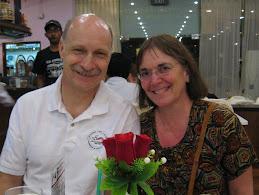Juli and I were up bright and early (or early and surly, depending on your attitude) to venture forth to the Belltown Health & Social Services office. The website promise was that if one appears before 9 am, one can be assured of a live-person interview. Juli gathered together an impressive stack of financial disclosure documents to augment her previously-submitted online application and we bussed downtown.
Our first impression was positive--a clean, empty waiting room; helpful, English-speaking office staff. When she gave them her SSN, she was told that she needed to be in the office upstairs.
Another universe altogether: A very bad-smelling room flanked by glassed in windows; sixty uncomfortable plastic chairs, facing a ceiling-hung 19" television tuned to The Today Show; thirty or so gangsta-panted men of employable age and apparent physical fitness, sprawled in the chairs; little balls of white fluff, rolling lazily across the sticky linoleum floor, escapees from someone's ripped down jacket? Juli took a number from the dispenser: #39.
Occasionally, the loudspeaker would crackle and blare: "Twenty! Number 20. Look at your tickets, people!" "George Smith to Window Eight!" Behind me, a very stoned couple was giggling uncontrollably. In front of me, a hustler sidled up to the only other woman in the room besides us, with the tempting offer, "I'll give you five dollars to trade your number for mine." In the corner, a very obese rent-a-cop cleaned his nails with a file and looked bored. What looked like a drug deal was going down in another corner. Two young men hissed threats at each other. An old Asian man was popping pills out of a blister pack into a paper bag. I was the only person in the room reading a book, an amazing curiosity by the look of the stares I got. Someone slid up to Juli's chair and asked for her cell phone number. She just stared at him wordlessly until he went away.
Juli was finally called to a window. After about 45 minutes she came out to the waiting room and told me to go get something to eat--she anticipated being there another few hours. She had the white spots on her nose that she gets when she is close to being spectacularly angry.
While I walked out to Subway for a sandwich (and a bottle of milk and package of apple slices for Juli--I was worried about her stomach being empty), Juli was experiencing the following:
Her caseworker (name-tagged: "Ababa"), played hunt-and-peck typing with two fingernails, entering into the computer all the information that Juli had already submitted online four days previously. "How much do you pay in rent?" Ababa inquired. Juli pointed to the correct line in the print-out that Ababa was looking at. Tap-tap-tap-tap, backspace, backspace, tap-tap. "How many people live in your household?" Juli again pointed. Etcetera. Occasionally, Ababa would get up suddenly and disappear for ten minutes. At one point, Juli had to show her how to access information on the internet to prove that Kerne was no longer working at Rite-Aid. And so on.
When we met up again back in the bad-smelling cattle-pen of a reception room, Juli was shaking with fury. One more wait for a call to the EBT window, and we were out of there.
"I am so mad, I can't even think up a funny story about this," Juli hissed as we walked to the bus stop.
We went to Pike Place Market, met up with Christy at the Market Street Grill, and I bought her a piece of grilled salmon to calm her down. When in doubt, feed the baby. The upshot of the four-hour ordeal is that she qualifies for nothing but food stamps. Again, because her husband is being responsible and working his butt off at a $10/hour job, they are not "truly needy." Her medical bills don't matter. Their debts don't matter. The fact that she can't work because she's sick doesn't matter--she has to be disabled for a year before she would be eligible for any help at all from Medicaid. The only upside is that the denial letter will help them apply for charity care at the hospital where all her tests are scheduled.
I am again floored by these so-called "social services." Twenty-seven years ago, pregnant with Juli, I went through this same process. Sitting in a room with all these disgusting people, wondering if I was now, "one of them." Feeling completely degraded by the attitudes of the bureaucrats. Outraged by the people who were obviously gaming the system I had paid into, only to find out that when I needed help, it wasn't available to me because I was still trying to work and be responsible for myself.
Nothing has changed.




